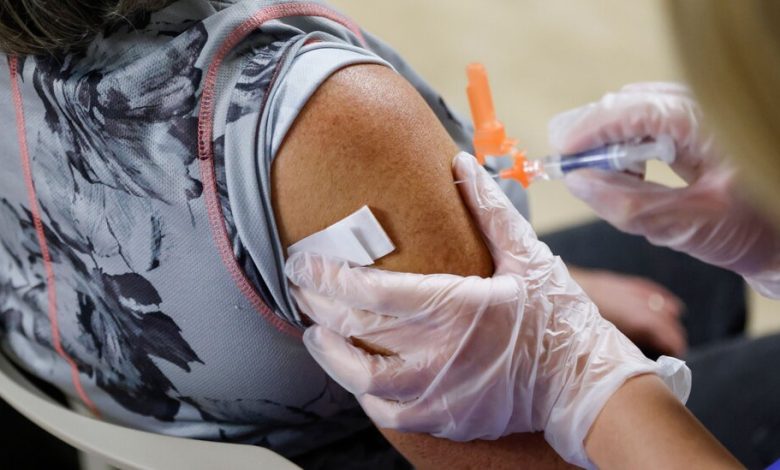Feeling Terrible After Your Covid Shot? Then It’s Probably Working.

A new study has an encouraging message for Americans who shy away from Covid shots because of worries about side effects: The chills, fatigue, headache and malaise that can follow vaccination may be signs of a vigorous immune response.
People who had those side effects after the second dose of a Covid vaccine had more antibodies against the coronavirus at one month and six months after the shot, compared with those who did not have symptoms, according to the new study. Increases in skin temperature and heart rate also signaled higher antibody levels.
“We know that vaccine uptake can be challenging, and in some cases, it can be so because some people have strong reactions to the vaccine,” said Aric Prather, a clinical psychologist at the University of California, San Francisco, who led the study.
“My hope is that this actually helps assuage some of those concerns,” said Dr. Prather, who studies how behavioral factors affect the immune system. “In fact, those symptoms, though they may be unpleasant, may actually be working for you.”
The study was posted online last week. It has not been reviewed for publication in a scientific journal. But several experts said it was well done, and its results were consistent with those from other research.
The relative increase in antibody levels among those who experienced side effects was small and doesn’t mean that people without symptoms don’t muster a strong immune response, experts said.
“Lack of side effects should not be taken as a sign that the vaccine’s not working,” said Alessandro Sette, co-director of the La Jolla Institute of Immunology’s Center for Vaccine Innovation, who was not involved in the work.
An earlier study found that 98 percent of people who felt no ill effects still produced copious amounts of antibodies, compared with 99 percent of those who had localized symptoms or worse, Dr. Sette said.
Still, the new results suggest that people who have a rough time after vaccination are likely to be well protected from the virus. “If you’re feeling crappy, then odds are that you’re probably mounting a pretty reasonable immune response,” said Deepta Bhattacharya, an immunologist at the University of Arizona who was not involved in the new study.
In research published last year, Dr. Bhattacharya and his colleagues looked at vaccine responses in 2,354 people, about half of whom took a painkiller to relieve side effects from the shot.
In mice, nonsteroidal anti-inflammatory drugs, such as aspirin and ibuprofen, severely impair immune responses to the coronavirus. But Dr. Bhattacharya’s team found that in people, the medications did not mute the immune response to Covid vaccines.
Not only that, but those who took a painkiller seemed to have more antibodies than those who tolerated the symptoms without medication. The most likely explanation for that is not that the painkillers increase antibody levels, Dr. Bhattacharya said.
“It’s more that people who have symptoms tend to have a slightly greater antibody response than those who don’t, and of course the people who have symptoms are more likely to take painkillers,” he said.
Other studies have also found that people with self-reported side effects, including fever, chills, body aches and fatigue, had slightly more antibodies than those without the symptoms.
In the new study, Dr. Prather and his colleagues tracked people’s antibody levels over time. When the vaccines were introduced in December 2020, they scrambled to recruit study participants through ads placed in newspapers and on television and social media.
At the time, much of U.C.S.F. was still closed down, so they commandeered a Pilates studio in the university gym, moving equipment out of the way and bringing in phlebotomists to draw the participants’ blood. The scientists excluded anyone who had evidence of a coronavirus infection before or during the study.
“We knew we had this very finite period where people were rushing to get vaccinated,” Dr. Prather said. “It was just an intense time, but we had to do what we had to do.”
The team tracked symptoms among 363 participants who received the Pfizer-BioNTech or Moderna Covid vaccines for six days after each dose, and gave some participants biometric devices to record their temperature, breathing and heart rate.
Those who had seven distinct side effects — including chills, tiredness, feeling unwell and headache — produced nearly double the levels of antibodies as those who reported no symptoms, the researchers found. And a change in skin temperature of just one degree Celsius predicted antibody levels three times higher six months after the second dose.
The study measured protection against the Wuhan variant, the original version of the coronavirus. The research would be difficult to perform now because people have already had multiple infections or shots that would influence their immune responses, Dr. Prather said.
The current Covid shots are designed to protect from the XBB.1.5 Omicron subvariant, but the results should still be relevant to all iterations of the vaccines, experts said.
The rollout of Covid vaccines this fall has been bumpy, with canceled appointments and confusion about insurance coverage. But about four million Americans received the shots last month, according to the Department of Health and Human Services.




